Ellen and Jim Have a Blog, Too
We are two part-time academics. Ellen teaches in the English department and Jim in the IT program at George Mason University.


The politics of biography redux: Burney & Austen hijacked? · 16 March 09
Dear Friends,
A revealing brouhaha has broken out over the latest Jane Austen biography: “Oxford academic in row with former student over Jane Austen book” by Jon Swaine (The Telegraph online, 15 March 2009).
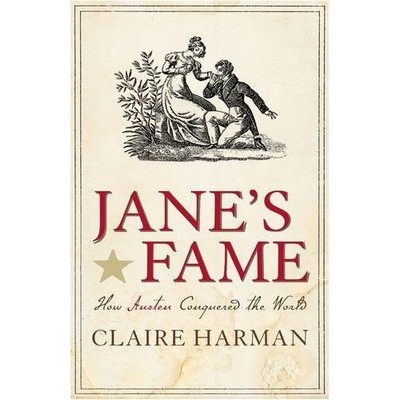
It will be very hard for Kathryn Sutherland to prove plagiarism of this kind as Sutherland’s book’s originality (Jane Austen’s Textual Lives) is in her delving into the manuscripts so thoroughly.
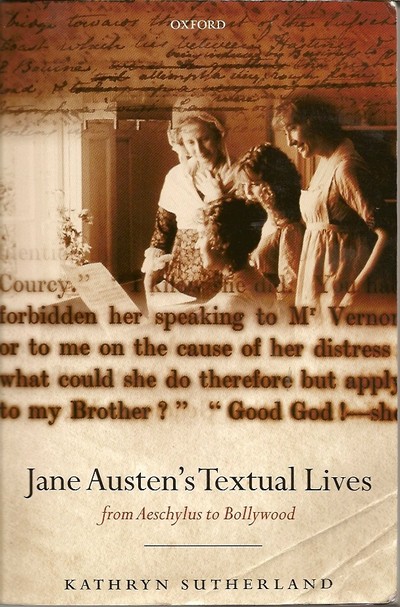
While her ideas about Austen’s business point of view feel new, they aren’t. They are in Jan Fergus’s Jane Austen, plus Nokes in his biography mentions how much Austen cared about fame, and money and a social life—he thinks she liked Bath. No one has ever denied Austen cared about making money; the difference is we are so much more detailed today and Fergus changed the emphasis. About the history of Austen’s biography and fame, nothing new here either. I wrote about it in my paper for Beatrice Battaglia’s anthology, Re-Drawing Austen: Picturesque Travels in Austenland, and in Jane Austen Among Frenchwomen. It’s common knowledge that the received biography is a projection of the family’s skewed conventionalizing of Austen, that much was destroyed and the present cult of Austen takes its rise from her nephew Edward Austen-Leigh’s sentimental memoir.
Could it be Sutherland is jealous? Claire Harman writes a simple lucid prose and her books are snapped up and bought in the way Claire Tomalin or Victoria Glendinning’s are. Harman’s book on Burney takes a great deal from reading Doody, Hemlow and others. I’ve written her and elsewhere that it’s excellent and I recommend it as a book to start with if you want to read just one: for a moving detailed life there is nothing like Joyce Hemlow, for a reading of the novels, Margaret Anne Doody is outstanding, but if you want both approaches combined in natural easy English in a book not too long, Harman is the one to go for. Plus, she alone dares to say the obvious truth no one else dares to (since the publication of the recent McGill set of journals) that the journals are partly imagined. Harman also has a long chapter on Burney’s French period but it’s not that well-researched. Basically she simply turned thoroughly to the diaries and studies The Wanderer as a text perhaps partly originally written in French or under French influence. What’s wonderful is she tackles this important period in Burney’s life for the first time. And her book has at long last replaced the early readable pop one about Burney as a prude (e.g., Emily Hahn’s A Degree of Prudery).
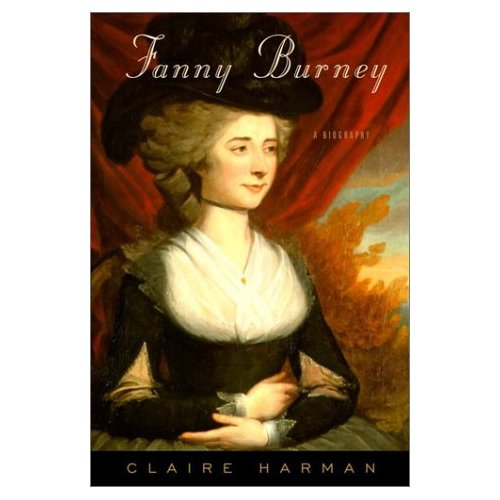
On Eighteenth Century Worlds where we are supposedly having a reading and discussion of Burney’s Camilla, one person is reading the book (I have read about 1/3rd of it plus all Margaret Anne Doody has written about it and its “ur-text” in her Frances Burney: The life in the Works); but everyone else I know of in this listserv community is reading Harman’s biography and enjoying it.
It should be admitted Burney biographies are a popular industry too. Kate Chisholm’s book is a rewrite of Hemlow (without the intense sympathy or understanding); Hester Davenport on Burney at court a conventional upholder of the establishment (the equivalent of a pro-family biography of Austen). Those worth reading are Linda Kelley on Juniper Hall (Burney’s time with the De Stael set where she met Alexandre d’Arblay), Judy Simons’s brief retelling, and for criticism, Julia Epstein’s The Iron Pen. You may skip the rest.
Better yet read Burney’s journals. They are her masterworks.
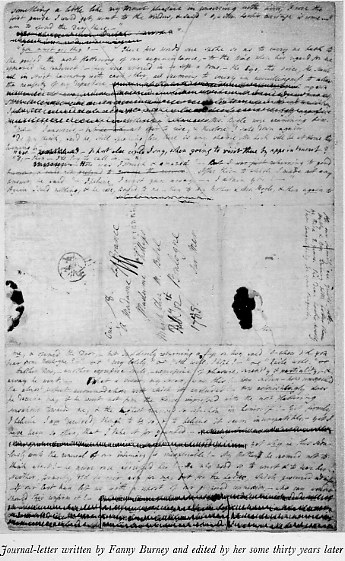
Sutherland did fight with Janet Todd too—some months back they had an altercation in the TLS letters section over the choices made in the new Cambridge editions of Austen (I wrote about this on my blog and if you want to reach it, another way to reach it is go to google and type: “site:moody.cx Todd” (or Sutherland or “Unchapmaned”). I got some good replies by people who had themselves worked on parts of the Cambridge or knew some of the people and issues involved accurately. Sutherland’s carving out space for herself the pre-eminent person who goes to the manuscripts, brings back the “real” biography (it’s she who did the edition for Oxford paperbacks of Austen’s brother’s, nephew’s and nieces’ biographies of her). And her edition is superb and ought to be read by everyone who thinks about biographies of earlier well-known figures:
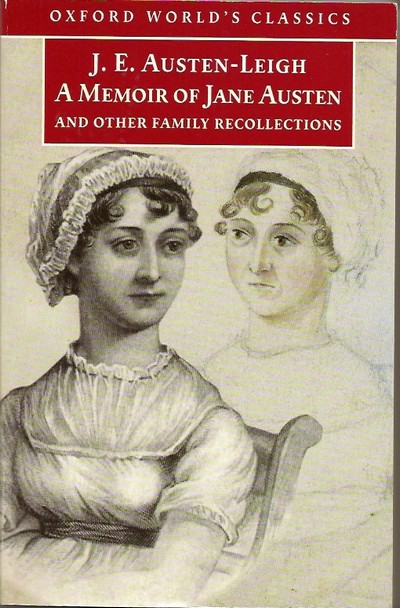
Well, she doesn’t want her position hijacked by someone else who reaches larger audiences the way Tomalin does.
On the other hand, it’s only fair to say such an article helps sell Harman’s book. Could it be that The Telegraph is creating a feud where only mild annoyance exists in order to sell its copy? And someone is helping Harman too by attracting attention. It’s hard to make room for a new biography of Austen after all. It was my contention for the first chapter of a book I was to write on Jane Austen and Bath that at the present time and in the present over-heated climate a persuasive accurate biography of Austen is impossible “Riddled with Untruths”. I could not get my publisher to listen to my idea for a biography of Anne Radcliffe and serious criticism of her work for a semi-popular scholarly book. He insisted no one had ever heard of her. I denied that but got nowhere: he conceded the gothic was known, and maybe her book Mysteries of Udolpho but not sufficiently. This way she will never rise to popular attention is the result of such commercial decisions.
Another aspect to consider: not only authors hawking biographies of familiar figures who publishers are willing to publish about, newspapers need to sell too. A few weeks The Times online was not above participating in reporting the ridiculing and denigrating of a young woman Oxford scholar Gail Trimble and a few days later the Telegraph came to her “defense” by showing she is about to get married and is actually very pretty after all so not to worry, no bluestocking horrors here!. Perhaps the girl and her family worked to get this story into the press too.
Politics of this kind is an endless onion unravelling at the center of which is money, fame, reputation, and ego and vanity.
Sutherland, Todd (and Nokes and Brian Southam) will all be at the conference in Bologna, Italy occurring later this month, Jane Austen Without Masks, and when my good friend, Tom, read my blog on that he remarked he’d like to know more about the politics behind the recent Blackwell’s Companion of Jane Austen. I’m beginning to think maybe I should buy and delve into this book too. It won’t be just the overt content that is of interest,
From battling books land,
Ellen :)
--
Posted by: Ellen
* * *
Comment
- From Arthur (friend on Austen-l):
“Good morning, Ellen. I think you’re right in your reading of that dispute. It’s notable in both accounts that the dispute consists almost entirely of Sutherland claiming offense. Harman doesn’t seem to have spoken. Of course, her publisher’s claim that studying the Austen industry is a ‘totally original’ approach is a bit excessive. Shakespeareans have been studying the Shakespeare industry for decades.
Regards,
Arthur”
— Elinor Mar 17, 5:56am # - Well, speaking frankly, it seems to me Sutherland is having a hard turf fight with Todd, partly because Sutherland has been doing the Penguin editions and Todd heads the Cambridge ones.
As for Harman, perhaps Sutherland is jealous of her. I read an article in a good scholarly periodical which likened Harman’s work to Tomalin and Glendinning’s: all sound and if not of the most high austere scholarship (use of primary sources always &c), good scholarship too. What’s more they are read and are readable. Sutherland’s Textual Lives is not fun as a read.
Claire Harman once contacted me. She came across my Burney page and commended it. Here it is:
http://www.jimandellen.org/burney.html
She had also come across a comment of mine either there or a posting or on my blog recommending her book, and she thanked me. Very gracious. Amanda Foreman (another semi-popular biographer) also wrote me a couple of times thanking me. Just a nice gesture. My online friendship with Beatrice Battaglia is sheerly that: online. She too first got into contact with me. Such moments are cheering for me.
Ellen
— Elinor Mar 17, 6:05am # - Partly since I’m listening to Donada Peters and David Case reading aloud The Tenant of Wildfell Hall, I began Lucasta Miller’s The Bronte Myth last night. It does fall right into the vein of argument suggested in the actual content of Harman and Sutherland’s books. As I’ve seen done elsewhere and on this blog for Austen and once tried in a conversation for Burney, Miller’s aim in part is to trace back to its origin the popularity of the Brontes, and how the myths formed, and then how cultural myths are manufactured and succeed in obscuring the actual texts of the authors and falsifying what their lives were.
Ellen
— Elinor Mar 17, 6:53am # - Dr. Moody,
I’d just like to thank you for your informative Austen posts; I’m going to be teaching my school’s first-ever Austen course next fall, and I find you a valuable resource.
Ray Tumbleson
— Elinor Mar 17, 8:34am # - At an 18th century conference I was at recently, the subject of Burney’s reputation and myths about her arose, and a group of us tried to pinpoint where her reputation took its rise. It’s true that the story of her copying out Evelina in a different hand, and then sending it to a publisher via her brother, and its remarkable success is true and part of the origin of her reputation. Also that she only got 10 pounds for it. But it is also true that after Cecilia and Camilla, partly the result of the fall of the ancien regime with which these two books are associated (as very 18th century texts), Burney’s reputation plummeted, particularly as a novelist. She was valued in the 19th century for her journals after her great-niece produced an abridged, censored, expurgated 5 volume set. These by-the-way read like a 5 volume novel from Mudie’s.
So where does her present reputation as a novelist and important writer come from? At the turn of the century the earliest female and feminist scholars in the academic world revived her books and produced editions of Evelina and Cecilia, and these were actually liked by the small world of women’s scholars at the time. Very small. A sustained attention was created Anne Raine Ellis who edited the early diaries as well as Cecilia. Then in the 1970s, Judy Simmons, Margaret Anne Doody and others took up the cause of Burney as a novelist and retold her life to emphasize how she hated the court and almost died there, her father’s unacknowledged forms of tyranny, her escape to a French emigre circle, marriage, and later life.
E.M.
— Elinor Mar 18, 11:05am #
commenting closed for this article
